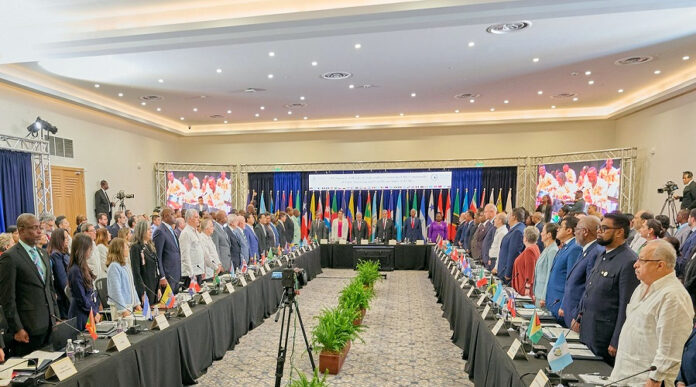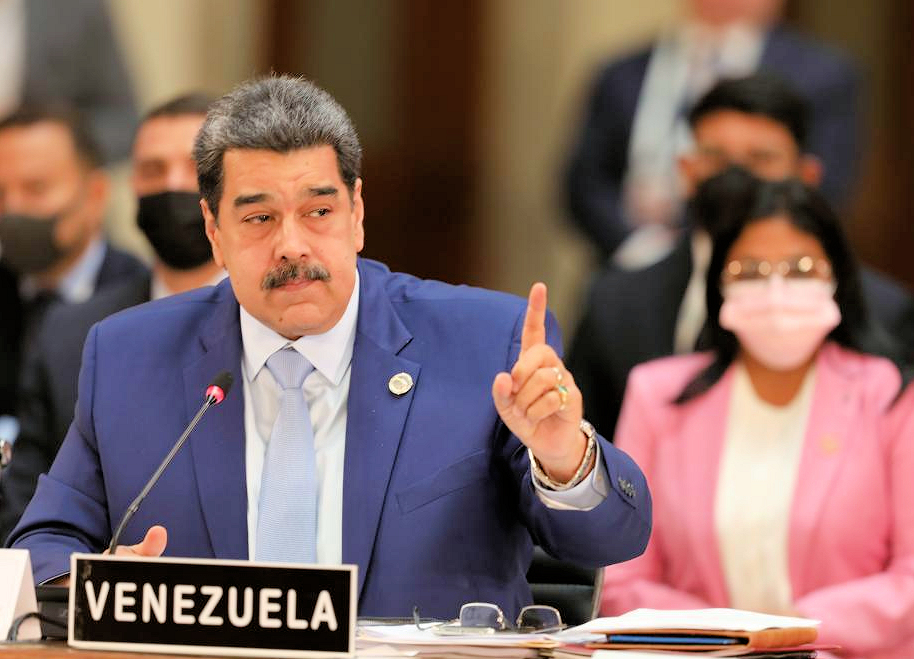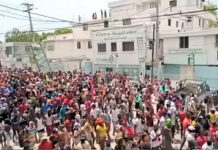
(Français)
The Community of Latin American and Caribbean States (CELAC) was founded in Caracas, Venezuela in December 2011 as an alternative to the Washington, DC-based Organization of Amercan States (OAS), formed in 1948 to be a Cold War chariot. Cuba characterizes the OAS as Washington’s “Ministry of Colonial Affairs, ” which expelled the socialist nation in 1962.
“As the years go by, CELAC is going to leave behind the old and worn-out OAS,” then Venezuelan President Hugo Chavez said at the 33-member alliance’s inaugural ceremonies.
“It’s the death sentence for the Monroe Doctrine,” said Nicaragua’s President Daniel Ortega at the South American confederation’s founding.
Indeed, the speeches at the 8th CELAC Summit, held in Kingstown of St. Vincent and the Grenadines on Mar. 1, echoed the fiery rhetoric of those ceremonies 13 years ago. Almost all of the addresses at the Summit condemned the on-going genocide in Gaza, U.S. aggression worldwide, and the need to stop all foreign interventions in the Latin America and the Caribbean.
Host Prime Minister Ralph Gonsalves said that CELAC’s mission is “anti-imperialist and anti-hegemony.”

“Despite all the difficulties we have faced, we have managed to maintain our historical custom of being a war-free zone,” said Honduran President Xiomara Castro, who became CELAC’s president until 2025. “Today we must reaffirm our commitment that never will a people of Latin America and the Caribbean use violence against a brotherly country.”
Cuban president Miguel Díaz-Canel called CELAC’s Proclamation of Latin America and the Caribbean as a “Zone of Peace” an “historic milestone” and said it “means hope for millions, whose main concern is survival in a world convulsed by violence and wars.”
Colombian president Gustavo Petro eloquently denounced the “genocide before our eyes” that Israel is committing against Palestinians in Gaza as well as Washington’s failed “war on drugs,” which had murderous effects on his country.”We have lived through a genocide of a million Latin Americans in the last half century,” he said.
Nicarguan President Daniel Ortega’s Minister advisor for Policy and International Affairs, Valdrack Jaentschke, also underlined the need to respect sovereignty, independence, and non-interference in the internal affairs of Latin American and Caribbean states, noting that “the reality is that we are facing attempts by imperialism to continue its colonialist and neocolonial practices, threatening the unity of our region.”
“Genocidal war and unilateral sanctions are expressions of an unjust, exclusionary, and undemocratic international order,” said Bolivia’s president Luis Arce about the “rules-based order” of Washington. “Multilateralism cannot continue to be hijacked by those who seek to impose a global dictatorship.” Arce also said that strengthening CELAC was the only alternative against war, warning that there was a new wave of foreign interference and hostile actions by the U.S. and United Kingdom that “seek to break the peace that we have established in the region.”
Therefore it was shocking to find in the Summit’s final document an endorsement for Washington’s project to wage war against the Haitian people to, in effect, keep de facto Prime Minister Ariel Henry in power.
The “Declaration of Kingstown,” in Article 73, states: “We call for the prompt and effective implementation of the United Nations Security Council resolution 2699 (2023), including the establishment of the necessary security conditions in Haiti as a means to hold free and fair elections in Haiti and lay the foundations for long term sustainable economic and social development in the country, strengthening security and addressing the underlying structural causes of ongoing violence and vulnerability.”
On Oct. 2, 2023, after almost a year of lobbying, Washington rammed through the Security Council Resolution 2699, on which both Russia and China abstained from voting. Its purpose was to establish the Multinational Security Support mission (MSS), an armed force NOT under the Security Council’s aegis, to be headed by 1000 Kenyan cops, infamous for their brutality and corruption.
Kenya’s High Court has blocked the police deployment as unconstitutional, but the U.S. and Kenyan President William Ruto are flouting the court’s ruling and trying to deploy the mission anyway.
This aberration at the CELAC Summit may be the result of Brazil’s stand on the deployment. In his statement at the summit, Brazil’s President Luiz Inácio Lula da Silva said: “In Haiti, we need to act quickly to alleviate the suffering of a population torn apart by social chaos. Brazil has been saying for years that Haiti’s problem is not just one of security, but above all one of development.”
It is not coincidental that U.S. Secretary of State Anthony Blinken traveled to Brazil to meet with Lula on Feb. 21. Furthermore, Lula was sadly responsible for Brazil leading the 2004-2017 UN Mission to Stabilize Haiti (MINUSTAH), a foreign military occupation that was responsible for rape, massacres, pollution, and a cholera epidemic in Haiti.
“The United States and Brazil co-hosted a ministerial meeting on the margins of the G20 Foreign Minister Meeting to build momentum to enable the successful deployment of a Multinational Security Support (MSS) mission to Haiti,” said a Feb. 22 State Department press release about the Rio de Janeiro meeting. “Participants discussed the need to support the Haitian people and the Haitian National Police in the face of unprecedented levels of gang violence and destabilization.”
UN Secretary General Antonio Guterres also attended the CELAC Summit and certainly influenced the inclusion of the shameful Article 73.
“Last week in Rio de Janeiro, several countries – including CELAC members – made additional pledges to the Multinational Security Support mission,” Guterres said in his statement to Summit. Only a handful of CELAC members are known to support the MSS, including Jamaica, Barbados, Bahamas, and Brazil.
Furthermore, Stéphane Dujarric, Guterres’ spokesperson, made clear the purpose of Blinken’s visit to pressure Lula a week before the CELAC Summit. “There is an urgent need to provide security and other support to Haiti to help the country deal with a pressing and worsening crisis of violence and instability,” Dujarric said. “It is also important to have predictable and sufficient financial contributions for the multinational security force.”
Dunjarric also said that Blinken’s visit was intended to “bolster support to finally address the vicious circle of insecurity, political instability, and poverty in Haiti, and generate support for the MSS in Haiti, as authorized by the Security Council.”
Thankfully, at the CELAC Summit, Venezuelan President Nicolas Maduro clearly announced his nation’s opposition to foreign intervention in Haiti, just as Hugo Chavez had opposed the MINUSTAH. “”We do not agree with any type of hidden invasion, bringing troops from here or there,” Maduro said. “It is not the solution for Haiti.”
CELAC should immediately revisit the “Kingstown Declaration” and excise Article 73, which just brings water to the mill of Washington’s project to concoct a black-face proxy force to once again militarily occupy Haiti for a third time in three decades. The Haitian people universally reject Washington’s transparent effort to salvage its now exiled puppet Ariel Henry.










